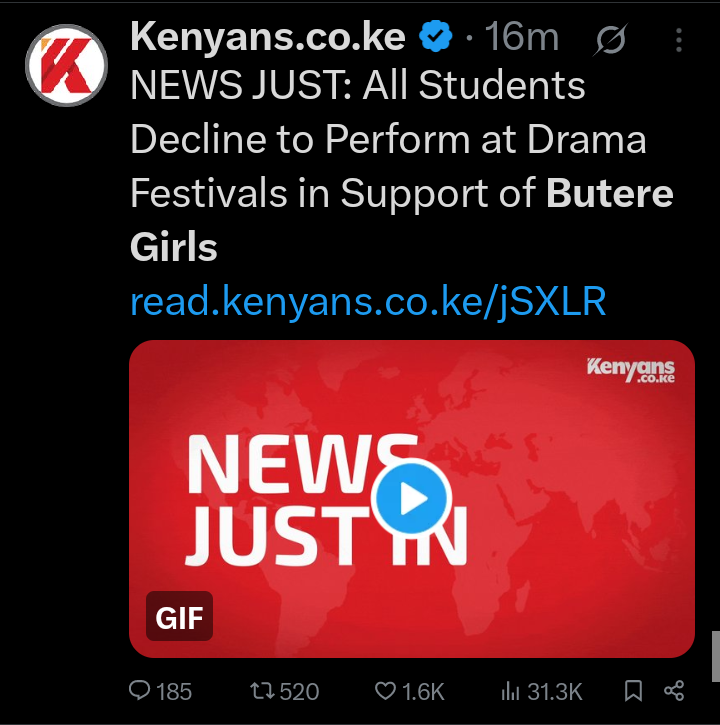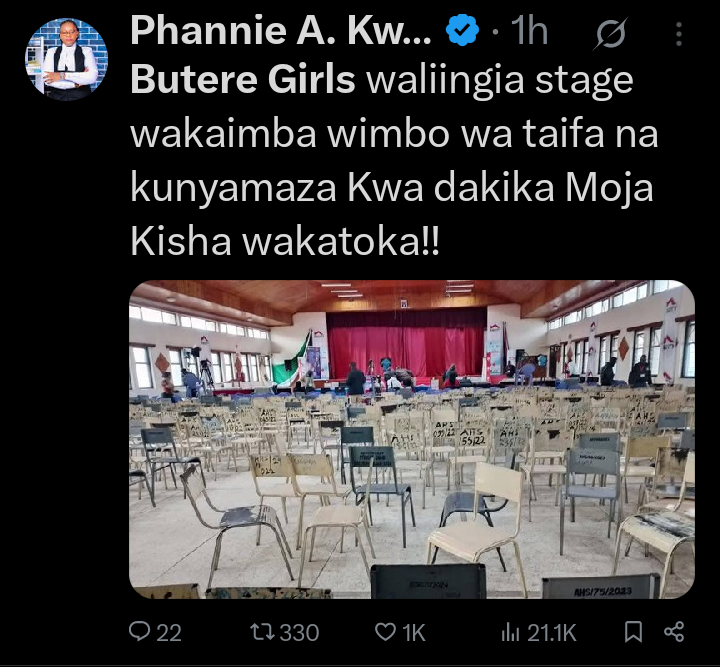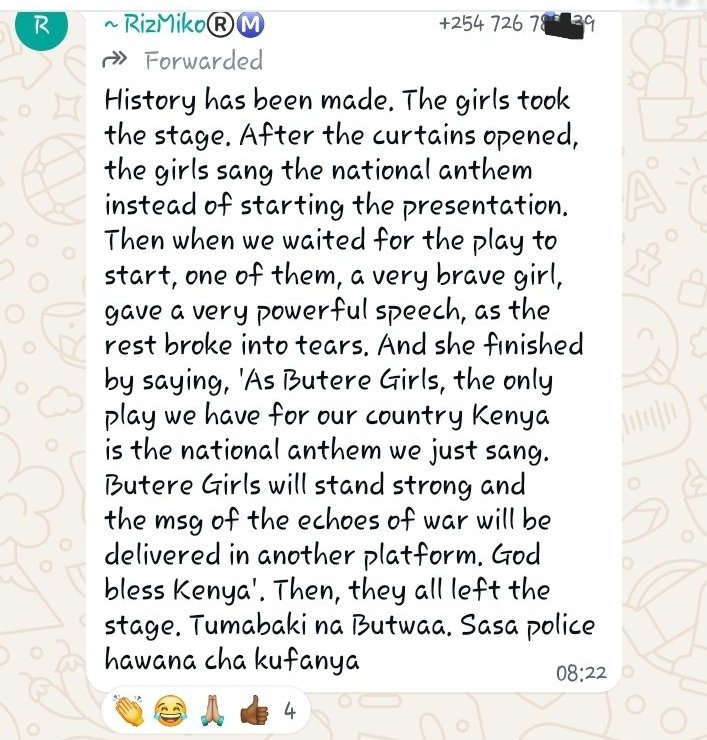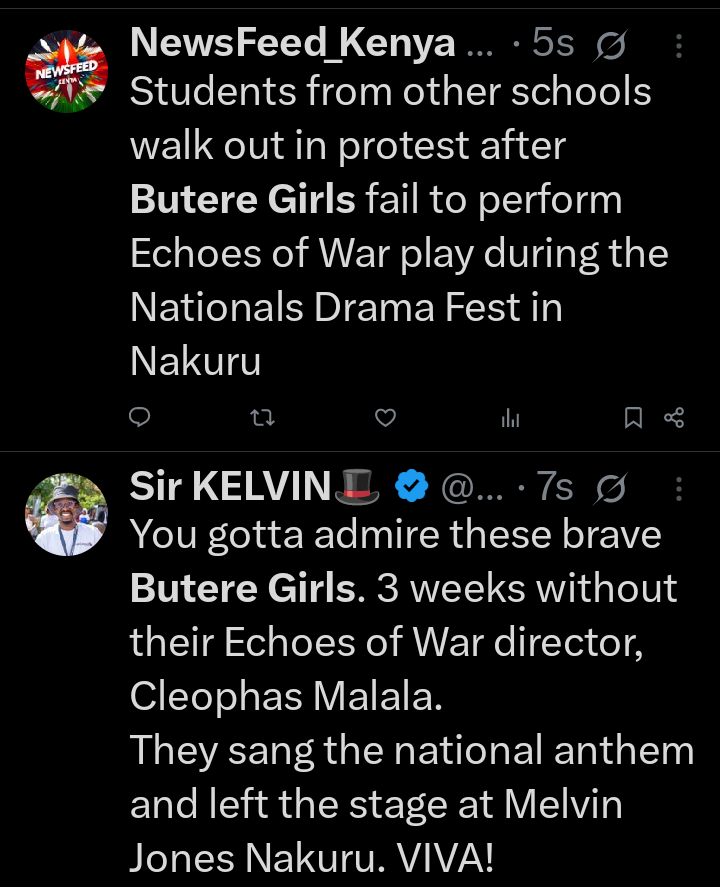The National Drama Festivals in Nakuru took a dramatic and politically charged turn on Thursday, April 10, 2025, when students from various schools chose to walk out in solidarity with Butere Girls High School. Their action was sparked by the controversy surrounding the Echoes of War play, which boldly critiques the current government under President William Ruto, depicting the oppression faced by ordinary citizens.
Butere Girls’ Bold Protest
Butere Girls were initially scheduled to perform their play, Echoes of War, which has been at the heart of political tensions. Instead of taking to the stage as expected, the students made a powerful statement. Around 8 a.m., the girls walked onto the stage but did not perform. Instead, they sang the national anthem before abruptly leaving the stage, rejecting the system that had denied them their basic rights.

The protest wasn’t just a symbolic act, it was a direct response to the harsh treatment they had received. Reports indicate that Butere Girls were denied essential resources that every other school had, including microphones, props, and a public address system.
Moreover, they were denied an audience for their performance, a situation that further exposed the system’s lack of support for the students.
The Missing Director and the Harassment
The frustration was compounded by the absence of their director, Cleophas Malala. The students had no chance to perform with their director present, which only fueled their sense of abandonment. Malala, a former UDA Secretary General, had been publicly vocal about the play’s critique of the government, making him a target of the ruling party’s ire.
One of the Butere Girls’ drama team members revealed the extent of the mistreatment: “We were harassed by the police. They took us to the stage with nothing. No equipment, no director. We couldn’t perform.” This description highlighted the harsh conditions the girls were subjected to, further emphasizing their grievance with the government-backed organizers of the festival.

The Arrest of Cleophas Malala: A Political Maneuver
The controversy surrounding Echoes of War escalated on the evening of April 9 when Cleophas Malala was arrested, ostensibly for his involvement with the play. Malala had publicly claimed responsibility for scripting the play, which depicted the struggles of ordinary Kenyans living under a government that stifles dissent and freedom of expression.
His arrest was widely seen as a political move, aimed at silencing both the play and the voices of those who dared criticize the government. Butere Girls’ walkout, therefore, became a statement not just against the suppression of their performance but also against the oppressive political environment that is suffocating the freedom of expression in Kenya today.
Solidarity: Nationwide Boycott of Performances
In an unprecedented act of solidarity, all the other students present at the National Drama Festivals refused to perform their plays in support of Butere Girls. This mass protest underlined the widespread discontent among students across Kenya, as they too felt the heavy hand of government control over their creative expression.
The walkout was not only a protest against the mistreatment of Butere Girls but also a powerful condemnation of a government that has consistently silenced critics.
It became clear that the students were not only protesting their individual struggles but also standing against the oppressive political atmosphere that stifles free expression.

A Symbol of Defiance Against Government Control
Echoes of War was not just a play, it was a symbol of defiance against a regime that has been accused of curtailing basic freedoms. The government’s response to the play and the arrest of Malala demonstrated its deep sensitivity to any form of dissent, especially when it comes from young voices challenging the status quo.
Butere Girls’ walkout and the subsequent boycott by other schools revealed the deepening rift between the government and the youth, who are increasingly becoming disillusioned with a leadership that prioritizes control over creativity and freedom.
The students made it clear that they were no longer willing to participate in an event that, in their eyes, had become a tool of government oppression.

A Call for Change and Accountability
The walkout by Butere Girls and the nationwide boycott that followed have forced the nation to confront the reality of its current political climate. The government’s attempts to silence critical voices, even within the arts and education sectors, have only exposed its fear of dissent and the stifling of free expression.
The events at the National Drama Festivals in Nakuru on April 10 have sent a clear message to President William Ruto’s government, the youth of Kenya are watching, and they will not stand idly by as their rights are trampled upon. The question now is whether the government will listen to this powerful call for change or continue down a path of suppression, further alienating the very citizens it seeks to govern.





















Add Comment